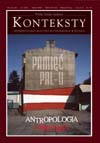Codzienność – lokalność – styl życia. Uwagi o założeniach epistemologicznych antropologii historycznej
Daily Life – Local Qualities – Lifestyle. Comments on the Epistemological Premises of Historical Anthropology
Author(s): Jacek KowalewskiSubject(s): Anthropology
Published by: Instytut Sztuki Polskiej Akademii Nauk
Keywords: everyday life; locality; anthropology; history
Summary/Abstract: The fundamental intention of this text is a presentation of the cognitive stand of historical anthropology from the vantage point of selected research premises in a current of Polish historiography known as the history of daily life. The text is composed of two basic parts, with the first encompassing, apart from introductory remarks on the origin and beginnings of historical studies on daily life, a characteristic of selected specific conceptual elements co-creating the historiographic category of daily life. In Polish historical narrations the category of daily life as a rule encompassed a conglomerate of the social conditions of existence, production and consumption, seen ”from below”. In other words, the history of daily life is the history of the family, women and children, the aged and the sick, the history of sexual life, birth, marriage and death, leisure, customs, beliefs and views and, finally, psychologically comprehended mentality. The praxis of historians is dominated by an objectivising description of people and their subjectivisation via a reconstructive and contextual reference to locally existing networks of meanings and cultural values. A thus understood category of daily life was contrasted with the idea of studying daily life built from the perspective of the epistemological assumptions of historical anthropology. In this case, references were made predominantly to the tradition of the phenomenological sociology of Alfred Schütz and Yuriy Lotman’s semiotics of culture as well as the correlated category of common knowledge and the conceit of the lifestyle. As seen by historical anthropology, daily life is an ideational stratum of reality, a sphere of the activity of cultural typisations expressed in local and historical forms of common knowledge. A comparison of those two significantly different perspectives shows, first, the current incommensurability of the strategy of research both into local history deciphered in the domain of the premises and cognitive objectives of historical anthropology; second, as a trend towards which historians of daily life interested in the anthropologisation of their research perspective should strive.
Journal: Konteksty
- Issue Year: 2011
- Issue No: 01
- Page Range: 6-20
- Page Count: 15
- Language: Polish
- Content File-PDF

